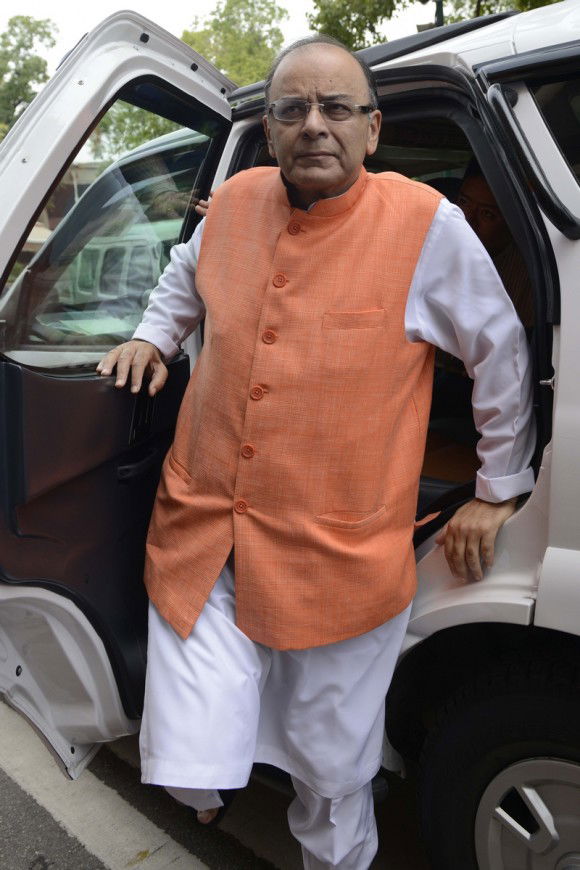Headlines
GST bill introduced in Rajya Sabha amid ruckus

New Delhi, Aug 11 Amid ruckus by opposition members in the Rajya Sabha, Finance Minister Arun Jaitley on Tuesday introduced a constitutional amendment bill to enable implementation of goods and services tax (GST) in the country.
The bill was introduced after a report by a select committee of the Rajya Sabha but when Congress MPs vociferously protested its introduction, the upper house was adjourned for the day by Deputy Chairman P.J. Kurien
As Congress members created a ruckus and trooped near the chairman's podium, Jaitley said the protests were aimed at stalling the economic growth of the country.
"The real purpose is that they want to stop economic progress ... they don't want the Indian economy to grow and that is why they are looking for one pretext or other to make sure that the GST legislation, which will give a boost to India's economy, is not passed," said a visibly angered finance minister.
"If the Congress party wants the economy of the country to slow down when every political party is in support of it, they must candidly say so," he added.
Introduction of the bill was opposed by Congress leader Anand Sharma, who said the business advisory committee has not allotted time for debating the measure.
Earlier, acknowledging that there might be merit in the Congress's demand for an 18 percent rate of GST, the finance minister in a Facebook post on Sunday held the opposition party responsible for disrupting parliament and said "its obstructionist tendencies inflict an economic injury on the country".
"The Congress members have proposed that a rate of GST be fixed in the constitution as not exceeding 18 percent. There may be some rationale in the rate recommended by the Congress," he said in a point-wise rebuttal of the Congress's dissent note to the select committee.
Noting that state governments belonging to the Congress have consistently supported the proposal, he asked whether the party was adopting a negative role "only out of an obstructionist attitude".
Since parliament convened for its monsoon session last month, house proceedings have been repeatedly disrupted over issues like the Lalit Modi controversy and the admission and recruitment scam Vyapam in Madhya Pradesh.
"Since parliament is not functioning and there is no way to clarify these points before the same, I am constrained to place the above facts in public domain," the minister wrote in his Facebook post titled "Dissent or Disruption - The Congress Party's Position on GST".
"Should its (Congress) obstructionist tendencies inflict an economic injury on the country," he asked.
The cabinet last month gave its nod to some changes recommended by a parliamentary panel, notably an extra one percent levy to compensate the states for potential tax losses.
The GST seeks to create a single Indian market by subsuming most indirect tax levies of the central and state governments, such as excise duty, service tax and value-added tax that is seen as facilitating tax compliance, and curbing inflation through better supply chains.
But securing legal sanction for GST is proving a lengthy process, given the Bharatiya Janata Party's lower strength in the upper house.
Being a constitution amendment bill, it needs passage in parliament with two-thirds majority, following which at least 15 state legislatures have to ratify it, before it is sent to the president for his assent.
The opposition is mainly opposed to the proposal for one percent additional tax on goods travelling from one state to another, as it is felt it would not only push up prices, but also have a cascading effect.
The central government has set the target to reform India's indirect tax regime from April next year. It had earlier proposed 100 percent compensation to states for the first three years.

2 hours ago
Shooting fallout: Trump threatens to strip citizenship of 'disruptors', halt 'third world' migration

2 hours ago
Republicans “outraged” after shooting of National Guards in Washington DC, demand immigration crackdown

3 hours ago
India-US alliance tightens grip on transnational drug networks

3 hours ago
Trump is the ultimate political pragmatist, says article on Russian state media

11 hours ago
Smriti Irani reflects on her milestones, journey, and lessons learned in nostalgic flashback Friday post

11 hours ago
Hema Malini reveals one of her most beautiful memories with Dharmendra

11 hours ago
Ashish Chanchlani reveals why he was stressed working with Arjun Kanungo in ‘Ekaki’

11 hours ago
Dharmendra expresses his longing for his ‘pind’ in the final poem penned by him

11 hours ago
Look out circular issued against suspended Cong MLA Rahul Mamkootathil

11 hours ago
Rahul Gandhi rakes up rising pollution in Delhi-NCR

11 hours ago
Karnataka: Massive crowds welcome PM Modi during Udupi roadshow

11 hours ago
India ranks third in Asia Power Index 2025, just behind US and China

11 hours ago
Man connected with firing at Kapil Sharma’s Canada cafe arrested in Delhi






















